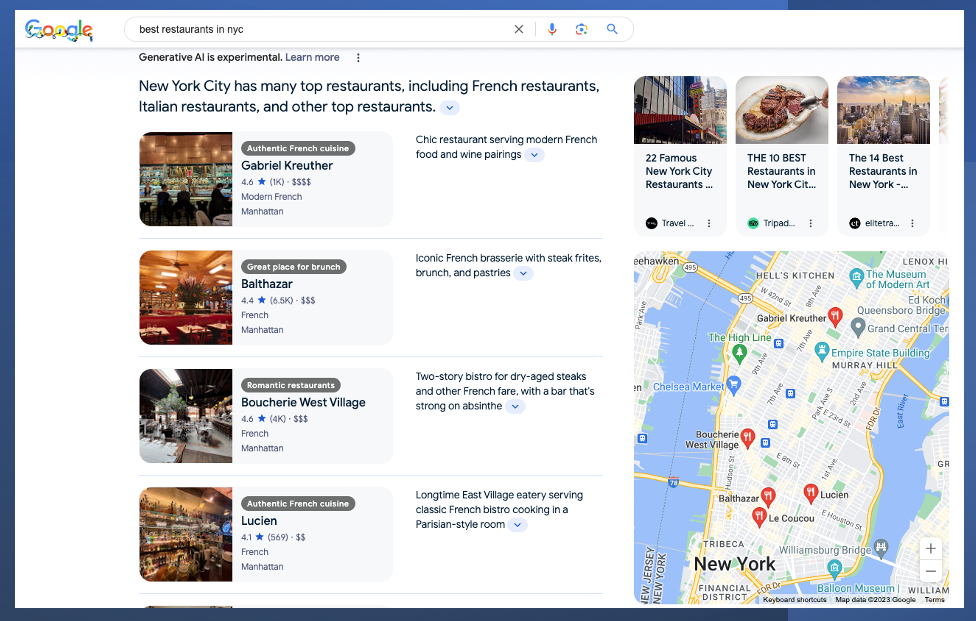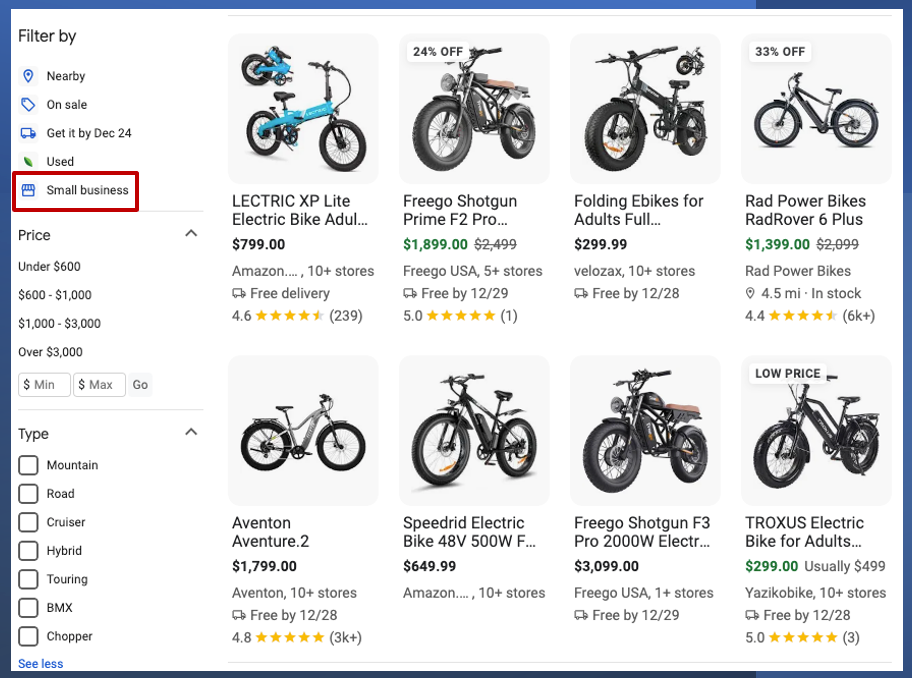SGE a 'Traffic Destroyer', AI Optimization, SMB Badges

SGE in 87% of Local SERPs
We don't yet have much data on how users are responding to Google SGE: whether it drives clicks or creates more zero-click results. Both SEOs and publishers have been busy trying to assess its potential impact on the rest of the SERP and traffic to their websites. Google and Microsoft have said that driving traffic to publishers is a priority. However, a recent analysis by The Atlantic ("40% of the magazine’s web traffic comes from Google") concluded that "75% of the time, the AI-powered search would likely provide a full answer to a user’s query." And the Wall Street Journal reports that publishers expect to lose "between 20% and 40% of their Google-generated traffic" post SGE. There are larger estimates too (60% plus), but it will probably be query and category dependent. Another recent study looked at the impact of SGE on 2 million search results and found Google's AI snippets appeared in 90% of searches and 87% of local search results. SGE formats vary by query type. However, the study found an average of 28 links in SGE (some behind drop-downs); 45% of those aren't from the top 10 organic results. Accordingly, some SEOs are hopeful SGE creates new ranking opportunities.

Our take:
- Informational searches are the majority on Google. This is where SGE could hurt traffic, as well as "commoditized" categories with few if any brands.
- SGE is a near duplication (at least visually) of the Local Pack. It could thus have a negative impact on Pack engagement. Brand awareness becomes more critical going forward; 80% - 90% of local searches are unbranded.
- Google is testing ads in SGE. More zero-click results will put further pressure on marketers to buy ads for visibility, in SGE and otherwise including LSAs.
AI 'Optimization' Dilemma
Authors and artists have filed multiple copyright suits against major AI platforms (Google, OpenAI, Microsoft, Meta, Midjourney). The common allegation is that their LLMs have been trained on copyrighted materials without permission. These cases are ongoing and unresolved, though plaintiffs have suffered some setbacks (e.g., here, here). The platforms have responded by offering to indemnify their customers against future copyright litigation. Google also created a robots.txt equivalent (Google Extended), which allows publishers to opt-out of AI training data (many have). And a few publishers have done content licensing deals (e.g., Axel Springer, AP). As indicated above, publishers fear losing significant traffic as well as brand value and ad revenue as user behavior changes and more discovery happens via AI tools. This creates a dilemma over how to respond: 1) block AI training inclusion, 2) license your content, 3) create plug-ins/extensions, 4) optimize for AI, 5) build your brand for direct traffic – or some mix of these. It's still very early and not clear which (or which mix) of tactics is right.

Our take:
- Advice on optimizing for Google SGE, right now, is very similar to optimizing for traditional search (review management, EEAT, schema, etc.).
- Although I'm an advocate of ChatGPT, Bard and others as Google alternatives, it's far from clear that's going to happen at scale.
- We'll know a lot more this time next year, but marketers/publishers need to utilize other channels for visibility and build their brands as a hedge.
Are SMB Badges Working?
In consumer surveys, people invariably say they want to support small merchants in their area. However, their behavior has traditionally fallen short of these intentions – they buy on Amazon. In 2021, a Nextdoor survey reflected the disparity (72% intention, 44% effort). Shopify also documented this "intention-action gap," finding that while 50% of US shoppers wanted to support local businesses only 36% actually did. But a new Q4 holiday shopping survey from Jungle Scout finds, "The percentage of consumers shopping for holiday gifts from local and/or small businesses ... jumped to 20% this year from 10% in 2022." These Jungle Scout numbers are lower than the earlier findings but it's the growth that's interesting. In November, Google introduced a new small business attribute and then made it a shopping filter. Amazon similarly rolled out a small business badge in 2022, which became a filter in October 2023. While we don't have data, it may be that these badges are helping elevate the profile of SMBs and affecting consumer choices and conversions.

Our take:
- Small businesses on Google and Amazon should embrace these attributes/badges. They help (some) consumers act on their values.
- Local inventory is also important. It can prompt consumers to shop more locally. All local product sellers should have product information on their Google Business Profiles.
- A 2021 survey I wrote found "67% of consumers trust local businesses more than online-only companies." Badges and real-time inventory help make local pop for otherwise e-commerce focused shoppers.
Recent Analysis
- LSA Spam Scam - It's Deja Vu All Over Again, by Mike Blumenthal.
- Near Memo episode 137: Can Gemini Fix Search? The Impact of Google’s Rating Bias, LSA Reviewjacking.
Short Takes
- Opinion: brand building should replace traditional linkbuilding.
- Whitespark: business hour rankings in action.
- More discussion of business hours as a ranking factor.
- Google review posting restrictions in the wild.
- Google testing new Google Business Profile layout (mobile)?
- Google enables seller ratings for e-commerce sites on the desktop.
- New GBP suspension emails feature a blue "appeal" button.
- Threads now widely available across Europe.
- Zagat Survey being revived by owner JPMorganChase.
- Deets a new curated, social travel site from a Kayak co-founder.
- TikTok heavily influencing GenZ purchases according to survey.
- Meta's smart glasses getting AI driven visual/voice search.
- SOCi introduces AI-social media content tool for multi-location brands.
- Why LLM-trained AIs may grow more unreliable over time.
- Google Chrome will test cookie deprecation in January.
Listen to our latest podcast.

How can we make this better? Email us with suggestions and recommendations.

